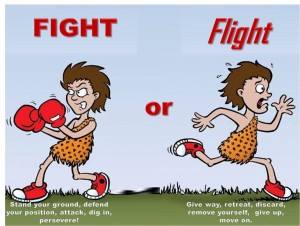Fear is a funny concept, and how our bodies process fear is a concept I’ve always pondered. What makes us instinctively step forward to fight, or to run in the opposite direction? What is it that makes me so afraid of spiders? Was I born with that fear trait or was it learned by my brain over the years?
The Theory
The “fight or flight” theory, also known as the acute stress response, was initially proposed by Walter Cannon, a Physiology professor at Harvard University, in 1915. Cannon was studying mice when he found his laboratory animals experienced change in their stomachs when afraid. This led him to further investigate the matter. His studies found that when threatened, the nervous systems partnered with the adrenaline in his animals, activating an instinctive nature to either fight, or to flee.
How It Works (Scientifically)
So, in order to trigger this instinct, the hypothalamus (a portion of the brain), interacts with 2 separate systems in the body: the adrenaline system and the nervous system (as said above). The nervous system is your body’s active movements, and reactions; whereas, the adrenaline system sits within your bloodlines. So, when faced with fear, your body’s nervous system immediately kicks in, relaxing the muscles and activating two parts of adrenaline: epinephrine and norepinephrine. Together, these two heighten your blood pressure and muscle contractions. At the same time, your brain also releases CRF into your body, in which activates up to 30 hormones (yes, 30). All of these factors are active contributors to how you instinctively react to a tense situation.
According to Cannon, your body may react to this in various ways:
- Heart Racing
- Sweating
- Heavy breathing
- Bladder relaxation
- Altered / compromised vision
- Dry mouth
Why do we fear?
To me, it seems that every specie on this planet possesses some attribute of fear, and reacts to it differently. For instance, many animals run in the presence of humans because well, we are bigger (to many), and typically the predator. However, if you happen to cross the wrong animal (i.e. a mama), she might attack you in fear of her offspring being in danger. So, it’s pretty interesting to realize that every specie experiences the “fight or flight” theory.
Can we learn to fear?
A question I proposed earlier was whether or not I was born to naturally fear spiders, or if I had learned to fear them throughout experiences in my life. Well, a study conducted by John Watson, they tested an infant (Little Albert) and his fear for white rats. In this study, though perhaps not the most ethical, they conditioned the child to associate the rat with fear. They achieved this by playing a loud startling noise every time Little Albert reached to play with a rat. The conclusion of this testing found that not only did the infant become terrified of the rats, but he also went on to fear other things resembling rats throughout his childhood.
I think in many ways we are all influenced by fear. For instance, as a child my mom was bitten by two dogs: a pit bull and a husky. They dogs jumped the fence and latched onto her face, leaving her bloody, frightened, and needing surgery. To this day, my mom refuses to acknowledge those breeds of dogs. Though she knows not all dogs have similar temperaments, she still gets uneasy around a pit bull or a husky. Something similar happened to me as a child, though it was my arm, and I still love any kind of dog that crosses my path, I don’t think I will ever be conditioned to fear dogs, haha.
Conclusion
All in all, fear is a natural part of being alive. Whether you fear spiders or clowns, your body goes through the same reactions chemically as any other specie on this planet. You cannot predict how you will instinctively react until you are faced with fear, and that’s what is so interesting. Though we all experience the same chemical reactions in our brains, adrenaline, and bloodstreams, how our bodies cope with the stress of a frightening situation is always different. So stop being afraid to fear, you are human, embrace it.
Sources:
Julia Layton “How Fear Works” 13 September 2005.
HowStuffWorks.com. <http://science.howstuffworks.com/life/inside-the-mind/emotions/fear.htm> 21 October 2016
“Epinephrine and Norepinephrine – Boundless.” Boundless. N.p., n.d. Web. 21 Oct. 2016.
Brown, Theodore M., and Elizabeth Fee. “Walter Bradford Cannon.” National Center for Biotechnology Information. N.p., Oct. 2002. Web. 21 Oct. 2016.
“Walter Cannon: Stress & Fight or Flight Theories – Video …” Study. N.p., n.d. Web. 21 Oct. 2016.





Very interesting post! I’ve known so many people who have had experiences similar to your mom. Some people are able to shake off the fear and move on and others really can’t interact with whatever triggered their fear in the first place. This all makes me wonder about our irrational fears–the fears that originate out of seemingly nowhere even if there was no traumatic experience. For example, I have a random fear of winks. I can do heights, roller coasters, and animals, but when I see someone wink it really freaks me out. The thing is, I have no idea why. I’d be interested to learn more about where our fears originate when there seems to be no cause. I’ve attached an article that starts to explain this topic. Overall, great post!!
You did a great job constructing your blog post for several reasons. The inclusion of a variety of studies and experiments really helped to prove your case and were all described in a clear and concise way. I also liked how you included personal experiences rather than only research. Your organization made it really easy to read and it was altogether structured very well. It would be interesting to research how people can get over their fears especially when they have a frightening experience like your mom did.
I really love hearing about topics about fear and what others fear because I have a bit of an unusual phobia myself. The thing is I do not think I was born with this phobia, rather it was definitely something that happened from an unpleasant experience. Of course, the younger siblings typically get picked on and yes, that was me. My older brother and cousin held me down and tickled me until I cried one day and it hurt so badly that I actually became afraid of being tickled. Believe it or not, I actually had a bit of a panic attack from it when my brother threatened to tickle me for not making him food one day. My body started shake, cry, and curl up into a fetal position trying to defend myself. My brother obviously did not tickle me once he realized how truly frightened I was, but to this day I still do not enjoy being tickled. I do not find it funny or cute. It is merely annoying and painful in my eyes. I just keep questioning though, why are our brains so powerful? How does one’s brain change even past developmental stages? I found an article that discussed phobias. Although the article analyzed some scientific research, it seemed like there were still a bunch of hypothesis thrown out there more so than actual trials themselves to come to a conclusion. I would like to see more experimental studies done to see how people develop phobias. LINK
I’m really curious to one thing about your post. What if an animals only instinct was to fight? Does this mean their hypothalamus only has one reaction? Like they weren’t trained in their life span but over time their brain had evolved? Or vice versa with animals whose only response would be to flee?
This is a great post, not only content wise, but also structurally. The headings and bullet points accompanied by the photos really made this an interesting read! Great job on that! Going off of what you mentioned about your mom, I have the same thing but with german shepherds! I have learned to fear them after a traumatic experience of one chasing me. I learned about this fight or flight concept in my psychology class, and it is truly interesting to me. The little Albert experiment is so interesting but also sad. There is a video on youtube of it, and it’s quite odd. It does, although, get the point across very well!! If you haven’t checked it out, you should! Great post!